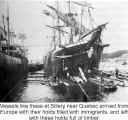
German Heritage in Canada
by Alidë Kohlhaas
Part 34
Destination Canada

This did not happen in British North America. There, as one official wrote, "the German emigrant becomes an English Canadian and thus loses any national significance for his mother country." In other words, these emigrants did not help the German states to gain influence in British North America. Since German shipping companies carried out more trade with the USA than with the British colonies, there was less opposition from the German states to emigration there, even though this did not lead to political influence.
When, however, economic disaster and famine hit many of the German states, those old prejudices against British North America faded, and chauvinism was put on the backburner. If the colonies wanted German settlers, they should have them. After all, once their passage was paid for, and a little pocket money handed over to them, the German governments could wash their hands of these hungry mouths. The almshouses had to be emptied.
The ban against shipping brokers was either lifted or ignored, and major shipping lines began to send their agents across the German lands to find emigrants. This human cargo would fill the empty hulls of ships leaving European ports for North America, where it would be replaced with needed raw materials destined for Europe. It was a good way to make money for these lines, for they treated their human cargo shabbily.
The offer to bring Germans to the United States via Quebec City or other British North American ports was intended to bypass new American passenger laws. These limited the number of passengers ships were allowed to carry. But, fewer passengers meant less profit for the shipping lines.
The German states, too, wanted to protect the emigrants from harm. They devised measures under which those agents, who sold contracts for passages to North America, required a licence, and had to be bonded. But, it would appear, these agents were not well supervised. No one seemed to questioned the validity of telling emigrants that the journey to Quebec would lead them just as fast to Buffalo, NY, or the Midwestern United States as an American port, nor did anyone bother to inform the emigrants that by coming to Quebec, they might be travelling under worse conditions than had they gone directly to the United States.
The consul of Württemberg to Bremen encouraged his government to officially tell licensed shipping brokers that they can alter shipping contracts made out to an American port to that of a British North American port. Such alteration of the original contract had previously been forbidden and had been considered a punishable offence. Advertisements appeared in Württemberg newspapers in 1848 from brokers for shipping companies from Bremen and Hamburg. These advised of regular departures of three-mast schooners for Quebec. Efforts were also made to persuade emigrants to sail from Liverpool for Quebec or Montreal.
 A
kind of rivalry now began between British, German and American shipping
companies. American agents sounded warnings against sending passengers for
the USA to Quebec, and informed the German governments of the far more
humane American passenger laws. They spoke of "the sad fate" of
the poor people, who were abandoned in Canada. As a result, by 1852 the
governments of Bavaria, Prussia and Saxe-Coburg-Gotha prohibited the sale of
passages from Liverpool.
A
kind of rivalry now began between British, German and American shipping
companies. American agents sounded warnings against sending passengers for
the USA to Quebec, and informed the German governments of the far more
humane American passenger laws. They spoke of "the sad fate" of
the poor people, who were abandoned in Canada. As a result, by 1852 the
governments of Bavaria, Prussia and Saxe-Coburg-Gotha prohibited the sale of
passages from Liverpool.
The bad publicity was countered in the southwestern German states by equally condemning newspaper campaigns by British shippers against the port of Bremen. Further more, an agreement was made between Bremen and the Central Department of Immigration in Quebec, which ensured that proper landing regulations and helpful hints were published that were to help emigrants to avoid exploitation on debarkation in Quebec. All German immigrants, who landed in Quebec or Montreal, were referred to an official German agent on arrival. His job was to give out free information about the cheapest way to travel inland, and where to find jobs, land for farming, and to redress any well-founded complaints about mistreatment during the journey.
Eventually, many German states prohibited the sale of inland passages from Quebec to the United States, and from American ports to Canada. But, while Prussia and Bavaria tried to send their emigrants to specific ports and areas of settlement, Baden and Württemberg let their emigrants choose their departure point and where they wanted to settle. In fact, it appears that the bulk of emigrants from the latter two states passed through Liverpool.
Just how much negative impact all of this controversial publicity about the Quebec route had on emigration to Canada cannot be determined. In the mid-1800s, when British North America consisted of five colonies, few kept records of the exact arrival of immigrants from the various German states. The different rules of each German state, the different departure and entry points all led to a lack of good information about the number of German immigrants, who arrived in Canada in the 1840s to ‘60s. At the same time, the German shipping companies in Bremen and Hamburg had lumped all passengers, German and non-German, whom they transported to British North America together in their statistics.
To be continued . . .
Comments to: alide@echoworld.com
